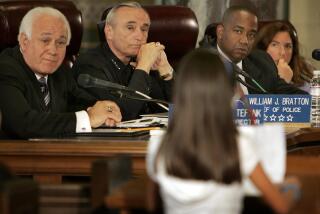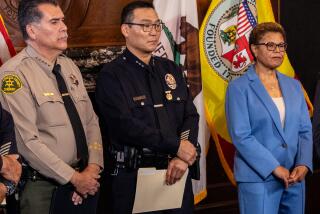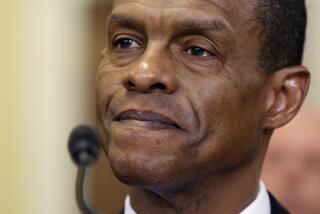Editorial: The thankless task facing LAPD’s new chief Michel Moore — updating police culture nationwide
The challenges that Michel Moore will face if he is confirmed to be the next chief of the Los Angeles Police Department crystallized soon after his selection was announced Monday, as he called for a new beginning for officers who could “step forward and be heard again” — and as his appointment by Mayor Eric Garcetti was blasted by community activists as a continuation of an LAPD culture of violence against nonwhite communities.
Moore currently serves as the department’s second in command under outgoing Chief Charlie Beck, and over the course of his 37-year career he has served in almost every leadership capacity. He will certainly be one of the most prepared people to serve as chief. But his success will depend on whether he can earn the trust of groups and communities that have vastly different ideas about policing.
Officers complain of low morale under Beck, who they blame for imposing unfair discipline. Activist groups, including the Los Angeles chapter of Black Lives Matter, hold Beck responsible for police killings of African American and Latino residents. They called for Beck’s firing at weekly Police Commission meetings and claimed credit when Beck announced earlier this year that he would step down on June 27, his 65th birthday, well before the expiration of his second and final five-year term. Moore acknowledged that one of his primary tasks would be to provide police officers with the best tools and training to both make the right split-second decision on whether to use deadly force, and to be able to survive the encounter.
Much of the job of chief is, in fact, a delicate balancing act. Redeploy officers to crime hot spots and leave other parts of town underpoliced? Protect law-abiding residents of high-crime areas but intrude on their dignity with stops and searches? Crack down on officer misconduct but lose the trust of the rank and file?
Anyone who lived through the videotaped police beating of Rodney King in 1991 knows that excessive uses of police force, especially against unarmed African American men, are nothing new. But in retrospect, the King beating was mild compared with the killings caught on video in more recent years and viewed by millions of people around the world. Moore will lead a department that has expressed a commitment to transparency in the investigation of such actions.
A successful police chief has to be better than good and must be more than right. A chief must be a visionary, a diplomat, an ambassador. A chief must be politic, without being dismissed by officers and communities as a mere politician with stripes and a badge. Policing necessarily involves questions of race, equity and politics — and it will not go unnoticed that Moore was chosen over two other finalists, one Latino and the other African American.
Yet, questions of ethnicity are as complex as the city’s people. Moore, whose birthname is Sanchotena, is the child of an immigrant from the Basque region of northeastern Spain, and Moore is listed in department records as Hispanic. (He won’t be the region’s first law enforcement leader of Basque descent. Eugene Biscailuz, L.A. County sheriff in the 1930s, ’40s and ’50s, was the son of an immigrant from the Basque region of France and the descendant of a Spanish soldier stationed at Mission San Gabriel).
A successful police chief has to be better than good and must be more than right.
Moore is a member of La Ley — the Latin American Law Enforcement Assn. — which sued the LAPD for discrimination against Latino personnel in promotion decisions. So is he Latino, and more to the point, does his heritage alone garner him or the department any support from the city’s Mexican American or immigrant communities?
It’s more likely that Moore will have to earn support the hard way, with outreach to communities around the city.
He said Monday he has already begun to do that, and that he has heard support for the department — but he also said he had heard people call on the LAPD to be more engaged and invested in the communities it serves.
Anyone watching Moore humbly accepting the mayor’s nomination can be forgiven for thinking the new chief is a bit of a softy. People who have worked with him know better. He is thoughtful yet tough, a bit wonky yet demanding.
Whether he likes it or not, his job will be to lead not just the Los Angeles Police Department but policing, nationwide, as an honorable profession and culture that require constant updating and reevaluation. It is a demanding task. He deserves thanks for taking it on, even as he prepares to be scrutinized for how well he does it.
Follow the Opinion section on Twitter @latimesopinion and Facebook
UPDATES:
4:03 p.m: This article was updated with additional details.
More to Read
A cure for the common opinion
Get thought-provoking perspectives with our weekly newsletter.
You may occasionally receive promotional content from the Los Angeles Times.






